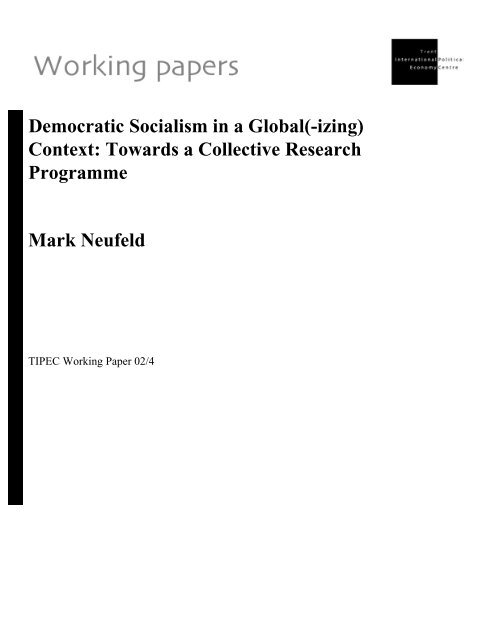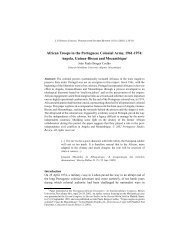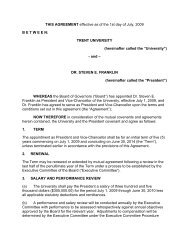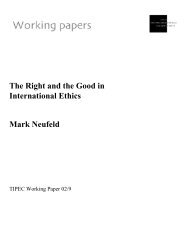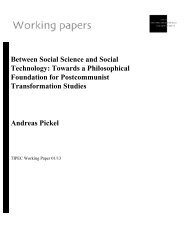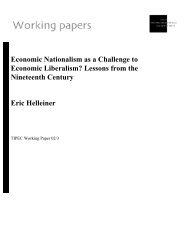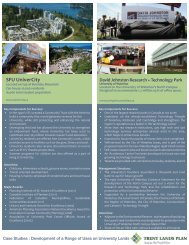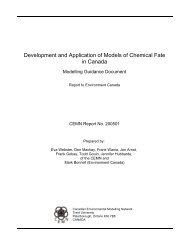Mark Neufeld, Democratic Socialism in a Global ... - Trent University
Mark Neufeld, Democratic Socialism in a Global ... - Trent University
Mark Neufeld, Democratic Socialism in a Global ... - Trent University
Create successful ePaper yourself
Turn your PDF publications into a flip-book with our unique Google optimized e-Paper software.
<strong>Democratic</strong> <strong>Socialism</strong> <strong>in</strong> a <strong>Global</strong>(-iz<strong>in</strong>g)<br />
Context: Towards a Collective Research<br />
Programme<br />
<strong>Mark</strong> <strong>Neufeld</strong><br />
TIPEC Work<strong>in</strong>g Paper 02/4
Maybe there are periods when one can get along without theory, but at present its<br />
deficiency denigrates people and renders them helpless aga<strong>in</strong>st violence.<br />
Max Horkheimer 1<br />
What the masses need is ... theory which gives them the chance of mak<strong>in</strong>g a system out of<br />
the detail acquired from experience, and which helps to forge a deadly weapon aga<strong>in</strong>st our<br />
enemies.<br />
Rosa Luxemburg 2<br />
Nancy Fraser has rightly observed that "no one has yet improved on Marx's 1843 def<strong>in</strong>ition<br />
of critical theory as `the self-clarification of the struggles and wishes of the age'". 3 What is<br />
undeniable is that <strong>in</strong> the current context, the "struggles and wishes of the age" are <strong>in</strong>creas<strong>in</strong>gly<br />
<strong>in</strong>tertw<strong>in</strong>ed with global-level structures and processes. As a consequence, the "self-clarification" of<br />
emancipatory struggles and wishes at the end of the 20th century perforce must be conducted <strong>in</strong><br />
globally-sensitive terms.<br />
In fact, the view that what is required is "global" th<strong>in</strong>k<strong>in</strong>g - "act locally, th<strong>in</strong>k globally" - is<br />
hardly controversial. Put simply, a view of politics restricted to local or even <strong>in</strong>tra-state processes<br />
and structures limits both knowledge and action. This observation holds no less for the project of<br />
develop<strong>in</strong>g a critical understand<strong>in</strong>g of the world that allows for emancipatory practice. 4<br />
Problems arise, however, when we fail to recognize that while global-level th<strong>in</strong>k<strong>in</strong>g may<br />
<strong>in</strong>deed be a necessary condition for critical understand<strong>in</strong>g, it is not sufficient. Indeed, one need only<br />
th<strong>in</strong>k back to early attempts to come to terms with the phenomenon of multi-national corporations<br />
as harb<strong>in</strong>gers of what is now called globalization to see that a global perspective has long marked<br />
the th<strong>in</strong>k<strong>in</strong>g and practice of transnational elites themselves. 5<br />
1
<strong>Mark</strong> <strong>Neufeld</strong>, <strong>Democratic</strong> <strong>Socialism</strong> <strong>in</strong> a <strong>Global</strong>(-iz<strong>in</strong>g) Context 2<br />
The obvious po<strong>in</strong>t is that global th<strong>in</strong>k<strong>in</strong>g is not <strong>in</strong>herently critical. Accord<strong>in</strong>gly, care must<br />
be taken to identify what k<strong>in</strong>ds of global-level th<strong>in</strong>k<strong>in</strong>g are critical - that is, promote emancipatory<br />
change - and which do not. This undertak<strong>in</strong>g is, by def<strong>in</strong>ition, a theoretical one and, as such, cannot<br />
suffice on its own. 6 It is, nonetheless, an unavoidable task if theoretically-<strong>in</strong>formed practice is to<br />
serve the ends to which progressive social movements are committed. 7<br />
To this end, <strong>in</strong> this paper I will undertake the follow<strong>in</strong>g. In the first part of the paper, I will<br />
exam<strong>in</strong>e what is arguably the most developed of the theoretical traditions embrac<strong>in</strong>g both a global<br />
perspective and a commitment to emancipatory practice - that of Gramscian International Political<br />
Economy (IPE). While not deny<strong>in</strong>g its strengths, I will draw attention to important weaknesses and<br />
lacunae <strong>in</strong> this tradition. Then, <strong>in</strong> the second part of the paper I will shift to an exam<strong>in</strong>ation of the<br />
work of a critical theorist - Rosa Luxemburg - which, I will argue, is not only compatible with the<br />
orientation of Gramscian IPE but which also offers important resources to address some of<br />
Gramscian IPE's weaknesses.<br />
The "Italian School" <strong>in</strong> the Study of World Politics:<br />
Gramscian IPE - also known as the "Italian School" - is considered to be one of only two<br />
fully-fledged schools of thought on world politics practised outside the United States. 8 Its orig<strong>in</strong>s<br />
can be traced by to two germ<strong>in</strong>al pieces by Robert Cox - "Social Forces, States and World Orders:<br />
Beyond International Relations Theory" and "Gramsci, Hegemony and International Relations: An<br />
Essay <strong>in</strong> Method", published <strong>in</strong> 1982 and 1983, respectively. S<strong>in</strong>ce then, the offer<strong>in</strong>gs of the<br />
Gramscian school, with its def<strong>in</strong><strong>in</strong>g notions of "critical theory vs. problem-solv<strong>in</strong>g theory",<br />
"historicism", "historical structures", "<strong>in</strong>tersubjective mean<strong>in</strong>gs", "production modes", and "counterhegemonic<br />
struggles" have been expanded upon not only by Cox but by an impressive <strong>in</strong>ternational<br />
group of neo-Gramscian scholars <strong>in</strong> Canada, Europe, Japan and even the United States. 9<br />
I will focus here on three themes which br<strong>in</strong>g out the strengths of the Gramscian approach<br />
- and which will also allow for a more productive consideration of its weaknesses: i) dialectics; ii)<br />
double-movement; and iii) democracy. I will take them up <strong>in</strong> the order given, rely<strong>in</strong>g heavily on the<br />
work of Robert Cox.
<strong>Mark</strong> <strong>Neufeld</strong>, <strong>Democratic</strong> <strong>Socialism</strong> <strong>in</strong> a <strong>Global</strong>(-iz<strong>in</strong>g) Context 3<br />
i) dialectics<br />
For neo-Gramscians, dialectics has two dist<strong>in</strong>ct, if <strong>in</strong>ter-related, dimensions. First, it can be<br />
understood <strong>in</strong> terms of ontology, understood as process at the level of history. In Cox's terms,<br />
dialectics "is the potential for alternative forms of development aris<strong>in</strong>g from the confrontation of<br />
opposed social forces <strong>in</strong> a concrete historical situation" 10 . It is an approach which "places power at<br />
the centre of its attention", where social power is understood as a "totality" 11 - "a conjunction of the<br />
outward and the <strong>in</strong>ward, of material capabilities and consciousness lead<strong>in</strong>g to purposive action". 12<br />
Accord<strong>in</strong>gly, it understands historical change to be the "result of conflicts, <strong>in</strong> which the emergence<br />
of a new form of consciousness leads to a shift <strong>in</strong> power relations which makes this new form of<br />
consciousness supreme over the erstwhile dom<strong>in</strong>ant form of consciousness". F<strong>in</strong>ally, at the level of<br />
ontology, dialectics also sees conflicts as lead<strong>in</strong>g to an Hegelian Aufhebung (sublation) - for<br />
example, <strong>in</strong> the notion of the "<strong>in</strong>ternationalization of the state" which simultaneously preserves and<br />
abolishes previous state-society constellations. 13<br />
Dialectics must also be understood at the level of epistemology - as a way of know<strong>in</strong>g. In<br />
epistemological terms, dialectics means a dialogue seek<strong>in</strong>g truth through exploration of<br />
contradictions. Central to this exploration process is a focus on <strong>in</strong>tersubjective mean<strong>in</strong>gs that<br />
constitute human practices and <strong>in</strong>stitutions. In this, the neo-Gramscian approach dist<strong>in</strong>guishes itself<br />
from all variants of positivism, which focus not on the dialectical relationship between<br />
consciousness and be<strong>in</strong>g, but on transhistorical regularities.<br />
F<strong>in</strong>ally, dialectics br<strong>in</strong>gs with it a reflexive recognition of the norms which <strong>in</strong>form all<br />
theoriz<strong>in</strong>g and the political projects different k<strong>in</strong>ds of theoriz<strong>in</strong>g serve. 14 In Cox's terms, "there is<br />
... no such th<strong>in</strong>g as theory <strong>in</strong> itself, divorced from a standpo<strong>in</strong>t <strong>in</strong> time and place"; rather, "Theory<br />
is always for someone and for some purpose". 15 Accord<strong>in</strong>gly, for the Gramscian school, the<br />
theorist's role is clear: it is "as much to arouse consciousness and the will to act as to diagnose the<br />
condition of the world". 16 As such, Gramscian IPE's "critical theoriz<strong>in</strong>g" dist<strong>in</strong>guishes itself clearly<br />
from the status-quo oriented "problem-solv<strong>in</strong>g" theory offered by ma<strong>in</strong>stream social science. 17<br />
ii) double movement
<strong>Mark</strong> <strong>Neufeld</strong>, <strong>Democratic</strong> <strong>Socialism</strong> <strong>in</strong> a <strong>Global</strong>(-iz<strong>in</strong>g) Context 4<br />
In the terms of Gramscian IPE, the notion of the "double movement" holds a central place.<br />
Borrowed from the work of Karl Polanyi, 18 for neo-Gramscians the notion of the "double<br />
movement" refers to society's <strong>in</strong>st<strong>in</strong>ct for self-preservation, manifest <strong>in</strong> national terms <strong>in</strong> first half<br />
of 20th century after the triumph of liberalism <strong>in</strong> the 19th. Follow<strong>in</strong>g Polanyi, they see social history<br />
<strong>in</strong> the n<strong>in</strong>eteenth century as the result of the "double movement" <strong>in</strong> which efforts to extend the<br />
purview of the "self-regulat<strong>in</strong>g market" gave rise to a counter-movement i) on behalf of workers<br />
<strong>in</strong>volv<strong>in</strong>g social legislation and factory laws; ii) on behalf of nature and the "culture of the<br />
countryside" <strong>in</strong> the form of agricultural tariffs, law and order policies and land laws; iii) on behalf<br />
of stability <strong>in</strong>volv<strong>in</strong>g the abandonment of the <strong>in</strong>ternational gold standard <strong>in</strong> favour of stable currency<br />
policies adm<strong>in</strong>istered by central banks. 19<br />
The attraction of Polanyi's notion of the double movement for adherents to the Gramscian<br />
school is clear - <strong>in</strong> a context <strong>in</strong> which liberal notions of the "self-regulat<strong>in</strong>g market" are aga<strong>in</strong><br />
hegemonic not only at the level of national social formations, but <strong>in</strong> terms of world order as well,<br />
the "double movement" serves as a Sorelian "social myth" that can serve subord<strong>in</strong>ated social forces<br />
"as a weapon <strong>in</strong> the struggle as well as a tool for analysis". 20<br />
iii) democracy<br />
The f<strong>in</strong>al theme to be highlighted <strong>in</strong> Gramscian IPE is that of democracy. And here the<br />
approach offers important assets. First, it speaks of democracy not only as a formal structure, but<br />
as a process. It is a process, furthermore, which sees not only political elites as active participants<br />
<strong>in</strong> history. Rather, it envisages democratization as the mobilization of the marg<strong>in</strong>alized aga<strong>in</strong>st<br />
economic efficiency orthodoxy. As such, neo-Gramscians see democracy <strong>in</strong> relational terms -<br />
specifically, they see the process of democratization as the "determ<strong>in</strong>ate negation" of the process of<br />
globalization, itself understood as an <strong>in</strong>herent tendency of capitalism. In short, democratization is<br />
understood to <strong>in</strong>volve freedom of <strong>in</strong>itiative and freedom to build new world order "from the bottom<br />
up".<br />
Consistent with this "participatory" notion of democracy goes a recognition of "difference"<br />
with<strong>in</strong> the global polity. Cox <strong>in</strong> particular has developed a parallel treatment of "civilization" - like<br />
democratization, understood as a process of history and product of social struggle - to try to address
<strong>Mark</strong> <strong>Neufeld</strong>, <strong>Democratic</strong> <strong>Socialism</strong> <strong>in</strong> a <strong>Global</strong>(-iz<strong>in</strong>g) Context 5<br />
the issue of identity and difference <strong>in</strong> the context of coord<strong>in</strong>ated struggles aga<strong>in</strong>st the power of<br />
globaliz<strong>in</strong>g - and homogeniz<strong>in</strong>g - structures and processes. 21<br />
In sum, for its rootedness <strong>in</strong> the marxist historical materialist tradition, for its offer<strong>in</strong>g of a<br />
collective research programme oriented to the search for alternatives to the established order, and<br />
for its global perspective, Gramscian IPE deserves serious consideration by those for whom<br />
socialism "is not merely a subject for facile speeches at Sunday public meet<strong>in</strong>gs". This is not to say,<br />
of course, that the approach does not suffer from lacunae and significant weaknesses. It is to a<br />
consideration of those that we now turn.<br />
The Ant<strong>in</strong>omies of Gramscian IPE: 22<br />
As way noted above, it is a fundamental assumption of the Gramscian approach that "Theory<br />
is always for someone and for some purpose". What holds for theory must also hold for critique.<br />
Accord<strong>in</strong>gly, it is appropriate that some space be given here to reflect<strong>in</strong>g upon the perspective<br />
underly<strong>in</strong>g the critique of Gramscian IPE that will be offered.<br />
It can be seen as a measure of the success of Gramscian IPE <strong>in</strong> establish<strong>in</strong>g itself as an<br />
approach to be reckoned with that critiques of the approach have begun to appear <strong>in</strong> the scholarly<br />
literature. These critiques fall <strong>in</strong>to one of two camps. First, there are those which grow out of and<br />
reflect (often unacknowledged) ma<strong>in</strong>stream assumptions and commitments (conservative as well<br />
as liberal-reformist). 23 Such critiques certa<strong>in</strong>ly merit respectful consideration, and require a serious<br />
response. The themes they raise - for example, how Gramscian IPE stands <strong>in</strong> relation to Gramsci<br />
scholarship as a whole 24 - are <strong>in</strong>terest<strong>in</strong>g and important questions. However, given that they do not<br />
share historical materialist epistemological and ontological assumptions, democratic socialist social<br />
and political commitments, they are of limited use <strong>in</strong> advanc<strong>in</strong>g the goal be<strong>in</strong>g pursued here.<br />
The critiques with<strong>in</strong> the second camp, <strong>in</strong> contrast, are of direct relevance, given that they do<br />
flow from a shared concern with radical, emancipatory change, and take, as the neo-Gramscians do,<br />
the precepts of historical materialism as the foundation for theory and practice. 25 These offer<strong>in</strong>gs<br />
are motivated by and oriented toward exactly the k<strong>in</strong>d of "exploration of alternatives" and<br />
"democratic socialist practice" required by the collective research programme envisioned. 26 As such,<br />
they stand as a regulative example of the k<strong>in</strong>d of critique that will be offered.
<strong>Mark</strong> <strong>Neufeld</strong>, <strong>Democratic</strong> <strong>Socialism</strong> <strong>in</strong> a <strong>Global</strong>(-iz<strong>in</strong>g) Context 6<br />
To beg<strong>in</strong>, the notion of dialectics raises important questions <strong>in</strong> terms of the conceptualization<br />
of the theory-practice relationship. As noted above, <strong>in</strong> the effort to "be a guide to strategic action for<br />
br<strong>in</strong>g<strong>in</strong>g about an alternative order", 27 neo-Gramscian theoriz<strong>in</strong>g aims "to arouse consciousness and<br />
the will to act". 28 Accord<strong>in</strong>gly, neo-Gramscian theoriz<strong>in</strong>g <strong>in</strong>corporates an "educative" - as opposed<br />
to an "<strong>in</strong>strumental" - conception of the relationship of theory to practice. What is dist<strong>in</strong>ctive about<br />
an educative conception of the theory-practice relationship is that it<br />
does not see social theory as useful because it allows people to manipulate causal<br />
variables so that they can get what they want <strong>in</strong> an efficient manner. Instead, social<br />
theory is seen as a means by which people can achieve a much clearer picture of who<br />
they are, and of what the real mean<strong>in</strong>g of their social practices is, as a first step <strong>in</strong><br />
becom<strong>in</strong>g different sorts of people with different sorts of social arrangements .... The<br />
purpose of ...theory is to engender self-knowledge and so to liberate people from the<br />
oppressiveness of their social arrangements. 29<br />
In short, an educative conception of the relationship between theory and practice corresponds not<br />
to the positivist goal of the replacement of politics by the "adm<strong>in</strong>stration of th<strong>in</strong>gs", but to the<br />
democratic ideal of human be<strong>in</strong>gs consciously act<strong>in</strong>g together to def<strong>in</strong>e and organize the community<br />
<strong>in</strong> which they live; not to the positivist telos of "social eng<strong>in</strong>eer<strong>in</strong>g", but to the Aristotelian telos of<br />
the "lead<strong>in</strong>g of a good and just life <strong>in</strong> the polis". Even to the degree that one accepts this position,<br />
further elaboration is necessary. At a m<strong>in</strong>imum one would like some <strong>in</strong>dication from neo-<br />
Gramscians as to how consciousness is to be "aroused"; how the <strong>in</strong>sights of critical forms of<br />
theoriz<strong>in</strong>g are to be made "real" to people; how those who produce that theoriz<strong>in</strong>g - <strong>in</strong>tellectuals -<br />
should see their role. 30<br />
A second set of questions can be raised <strong>in</strong> regard to the notion of the "double movement"<br />
which, as was noted above, is central to the efforts of the neo-Gramscians to conceptualize the<br />
possibility of organized resistance to global-(iz<strong>in</strong>g) capital. This notion is not without its difficulties,<br />
however. Perhaps the biggest liability <strong>in</strong> embrac<strong>in</strong>g the Polanyian notion of the "double movement"<br />
is that Polanyi's th<strong>in</strong>k<strong>in</strong>g about society was strongly marked by a conservative structuralfunctionalist<br />
ethos. As a close read<strong>in</strong>g of Polanyi shows, for him the society-defend<strong>in</strong>g part of the
itself. 33 This raises the question of whether counter-hegemony should aga<strong>in</strong> be organized first and<br />
<strong>Mark</strong> <strong>Neufeld</strong>, <strong>Democratic</strong> <strong>Socialism</strong> <strong>in</strong> a <strong>Global</strong>(-iz<strong>in</strong>g) Context 7<br />
"double movement" seems to arise automatically. The implications are significant. As one neo-<br />
Gramscian scholar notes,<br />
If this impulse for social protections is seen to have arisen automatically, even<br />
unconsciously and as a consequence of the objective contradictions of the selfregulat<strong>in</strong>g<br />
market, then what need is there for self-conscious agency <strong>in</strong> this<br />
analysis? 31<br />
Given the apparently uncritical embrace of this concept, it is hardly surpris<strong>in</strong>g that, while adept at<br />
analyz<strong>in</strong>g the power of capital, so many neo-Gramscians seem content to look to structural<br />
contradictions of globalization as sufficient for the construction of counter-hegemony, and neglect<br />
to engage <strong>in</strong> a susta<strong>in</strong>ed analysis of the more self-conscious efforts of social movements to contest<br />
globalization. Ultimately, however, this approach is severely limited. As Healy notes, "This sort of<br />
functionalism may suffice as a reform position which perceives resistance as that which simply<br />
slows down <strong>in</strong>exorable processes, but is <strong>in</strong>sufficient for a counter-hegemonic political project<br />
seek<strong>in</strong>g socialism as its goal". 32<br />
A second set of questions relat<strong>in</strong>g to the double movement relate to the issue of what the<br />
proper level at which to engage <strong>in</strong> counter-hegemonic struggle. Neo-Gramscians argue that we are<br />
once more at the beg<strong>in</strong>n<strong>in</strong>g of the double movement, where the notion of the "self-regulat<strong>in</strong>g<br />
market" is aga<strong>in</strong> hegemonic. The difference between the 19th century and the present, however, is<br />
that now the extension of market relations is tak<strong>in</strong>g place not at the national but at the global level.<br />
It is not only state-society complexes which are be<strong>in</strong>g transformed, but the nature of world order<br />
foremost at the level of the national social formation, or whether it should be organized<br />
"transnationally". 34 In this regard, one can take note of Panitch's critique of Cox. While prais<strong>in</strong>g Cox<br />
as an exception <strong>in</strong> a context <strong>in</strong> which "very few embrace the <strong>in</strong>sights and tools of analysis of the<br />
theory of the state as a way of understand<strong>in</strong>g the role the state is play<strong>in</strong>g <strong>in</strong> the construction of a<br />
global capitalism", 35 Panitch is concerned with how the state is theorized. He suggests that Cox<br />
underemphasises the importance of the national social formation <strong>in</strong> determ<strong>in</strong><strong>in</strong>g the character of the<br />
state, lead<strong>in</strong>g him to over-emphasize the possibility for counter-struggle at the <strong>in</strong>ternational level.
<strong>Mark</strong> <strong>Neufeld</strong>, <strong>Democratic</strong> <strong>Socialism</strong> <strong>in</strong> a <strong>Global</strong>(-iz<strong>in</strong>g) Context 8<br />
It can be argued that Panitch's concerns rest more on a mis-understand<strong>in</strong>g of Cox than on<br />
substantive disagreement. As one neo-Gramscian has argued <strong>in</strong> response, "In the end, Panitch and<br />
Cox end up <strong>in</strong> the same place, look<strong>in</strong>g for the basis of contestation <strong>in</strong> nationally based movements<br />
which may be `exemplary for one another', but which do not operate primarily at the <strong>in</strong>ternational<br />
level". 36 Indeed, Cox has argued clearly that the choice between the national and the <strong>in</strong>ternational<br />
is a false one. 37 But even if one accepts this, it can still be argued that neo-Gramscians are<br />
<strong>in</strong>sufficiently clear about how the two levels of struggle are connected, and about the relative<br />
weight<strong>in</strong>g of national political <strong>in</strong>itiatives, on the one hand, and multilateral <strong>in</strong>stitutions, on the other.<br />
Questions can also be raised about the neo-Gramscian conceptualization of democracy. As<br />
was noted above, democracy - understood as a process which can counter-act the globaliz<strong>in</strong>g<br />
tendencies of capitalism - is central to the neo-Gramscian framework. As Cox notes, however,<br />
democracy is a term which has many different mean<strong>in</strong>gs, and which can be bound up with radically<br />
divergent political projects. 38 This raises the question of what democracy means <strong>in</strong> neo-Gramscian<br />
terms. And here, it must be conceded, it is easier to discover what democracy is not, than what it is<br />
understood to be.<br />
Cox is quite clear, for example, that the "formal democracy" of bourgeois liberal pluralism<br />
is not what he has <strong>in</strong> m<strong>in</strong>d. This notion of democracy <strong>in</strong>volves a clear separation of the "political"<br />
and the "economic"; the market is understood to regulate the latter which simultaneously sett<strong>in</strong>g<br />
boundaries for the former. It is a conception of democracy which corresponds to the image of the<br />
state as a "transmission-belt", adapt<strong>in</strong>g the domestic population to the needs of the <strong>in</strong>ternational<br />
economy. 39 Nor, however, is democracy to be understood as be<strong>in</strong>g embodied <strong>in</strong> the socialdemocratic<br />
"welfare state", the Soviet-style bureaucratic centralist state, or even the "producer selfmanagement"<br />
market-socialist state. 40<br />
The nearest one can f<strong>in</strong>d to a clear affirmation of a conception of democracy is an expression<br />
of approval for "populist democracy", which must be "more than formal democracy" if it is to<br />
address the "democratic deficit" to which the latter has given rise. 41 This may well be true. Still, one<br />
could hope for greater precision on a concept so central to the neo-Gramscian political project.
<strong>Mark</strong> <strong>Neufeld</strong>, <strong>Democratic</strong> <strong>Socialism</strong> <strong>in</strong> a <strong>Global</strong>(-iz<strong>in</strong>g) Context 9<br />
In summary, then, despite considerable strengths, neo-Gramscian IPE does suffer from some<br />
significant lacunae. It is <strong>in</strong> the hopes of redress<strong>in</strong>g some of these weaknesses that we turn to the<br />
work of one of the most orig<strong>in</strong>al m<strong>in</strong>ds <strong>in</strong> 20th century socialist theory: Rosa Luxemburg.<br />
Toward a "Neo-Gramscian-Luxemburg L<strong>in</strong>e": 42<br />
To beg<strong>in</strong>, it is necessary to meet head-on the view that Rosa Luxemburg and contemporary<br />
followers of Antonio Gramsci are separated by too much <strong>in</strong> terms of assumptions and problematique<br />
for the work of the former to be able to make a contribution to the latter. Fortunately, the last several<br />
decades have seen impressive work <strong>in</strong> terms of the "retrieval" of the contribution of Luxemburg that<br />
more than demonstrates the commonalities <strong>in</strong> perspective and commitment. 43<br />
To beg<strong>in</strong>, like today's neo-Gramscians, Luxemburg was an <strong>in</strong>herently "dialectical" th<strong>in</strong>ker,<br />
both <strong>in</strong> terms of epistemology and ontology. 44 In terms of the former, she dist<strong>in</strong>guished clearly<br />
between non-critical "bourgeois" forms of theoriz<strong>in</strong>g and the critical, marxist tradition. In terms of<br />
the latter, she consistently adopted the viewpo<strong>in</strong>t of "totality" <strong>in</strong> view<strong>in</strong>g history as a process.<br />
Indeed, as Lukács noted with reference to Luxemburg <strong>in</strong> his History and Class Consciousness,<br />
It is not the primacy of economic motives <strong>in</strong> historical explanation that constitutes<br />
the decisive difference between Marxism and bourgeois thought, but the po<strong>in</strong>t of<br />
view of totality. 45<br />
Indeed, if "totality" taken to be the def<strong>in</strong><strong>in</strong>g characteristic of the 20th century "Western Marxist"<br />
tradition - a tradition <strong>in</strong> which Gramsci is regularly placed - then Luxemburg can stand alongside<br />
the philosopher of Sard<strong>in</strong>ia not only as a fellow Western Marxist, but as the very orig<strong>in</strong>ator of that<br />
tradition. 46<br />
A second clear po<strong>in</strong>t of commonality between Luxemburg and the Gramscian framework is<br />
the stress upon the masses as active agents of history, and of the central role of human consciousness<br />
<strong>in</strong> the mak<strong>in</strong>g of history. This perspective, moreover, directs the theorist to write history from a<br />
particular perspective - what Kaye has termed "history from the bottom up". 47 It also directs the<br />
theorist to conceive of the future as someth<strong>in</strong>g made <strong>in</strong> the present through self-conscious mass<br />
struggle, and not as the result of <strong>in</strong>exorable tendencies work<strong>in</strong>g themselves out beh<strong>in</strong>d the backs of<br />
social agents. 48
<strong>Mark</strong> <strong>Neufeld</strong>, <strong>Democratic</strong> <strong>Socialism</strong> <strong>in</strong> a <strong>Global</strong>(-iz<strong>in</strong>g) Context 10<br />
A third po<strong>in</strong>t of convergence with the neo-Gramscians - <strong>in</strong> particular, Cox's recent work on<br />
"civilizations" - is Luxemburg's attentiveness to "difference". Given her varied <strong>in</strong>ternational<br />
experience, liv<strong>in</strong>g <strong>in</strong> Poland, Russia, Switzerland and Germany, Rosa Luxemburg was well aware<br />
that "context matters", and that theory and practice must be sufficiently sensitive to any given<br />
context. As a Jew and a women she also understood the important of gender and race identities. 49<br />
In contrast to certa<strong>in</strong> currents with postmodernism, 50 however, Luxemburg - like present-day neo-<br />
Gramscians - was concerned not just with difference, but with the commonality with<strong>in</strong> difference<br />
- for example, shared <strong>in</strong>equalities <strong>in</strong> wealth and power across particular identities of race or gender<br />
- that make collective action both necessary and possible. 51<br />
Last but certa<strong>in</strong>ly not least, Luxemburg shares with neo-Gramscians a commitment to<br />
view<strong>in</strong>g politics not just <strong>in</strong> local or even national terms, but from a global perspective. Her work on<br />
imperialism, 52 notwithstand<strong>in</strong>g its limitations, rema<strong>in</strong>s as one of the most creative and orig<strong>in</strong>al<br />
efforts of the 20th century to theorize capitalism with due regard to its global dimensions. As such<br />
it cont<strong>in</strong>ues to <strong>in</strong>spire critically-oriented theorists who f<strong>in</strong>d Luxemburg's questions - when not her<br />
answers - of cont<strong>in</strong>u<strong>in</strong>g relevance <strong>in</strong> the study of capitalism. 53 Perhaps most importantly, the<br />
orig<strong>in</strong>ality of her <strong>in</strong>terpretation of imperialist expansion as be<strong>in</strong>g neither i) a reformable, if<br />
lamentable, aspect of capitalism (the view of social democrats) nor ii) simply a "stage" of capitalism<br />
(the view of Len<strong>in</strong>), but rather iii) an <strong>in</strong>herent and perpetual tendency with<strong>in</strong> capitalist social<br />
relations which can be blunted through collective action but rema<strong>in</strong>s a threat even then and which<br />
will not be eradicated until capitalism itself is transformed is of considerable relevance to our<br />
present. In essence, the Luxemburgian view of imperialism anticipated the neo-Gramscian<br />
understand<strong>in</strong>g of globalization, viewed <strong>in</strong> essentially the same terms. 54<br />
Indeed, the cont<strong>in</strong>u<strong>in</strong>g relevance of Luxemburg's understand<strong>in</strong>g of imperialism for<br />
conceptualiz<strong>in</strong>g globalization underscores the po<strong>in</strong>t of the present-ness of her thought. To recall<br />
Rosa Luxemburg's contributions from the beg<strong>in</strong>n<strong>in</strong>g of this century now at its end is no exercise <strong>in</strong><br />
nostalgia. As proof of this statement, I turn now to a consideration of how her thought can help to<br />
address some of the lacunae <strong>in</strong> neo-Gramscian th<strong>in</strong>k<strong>in</strong>g identified above. 55
<strong>Mark</strong> <strong>Neufeld</strong>, <strong>Democratic</strong> <strong>Socialism</strong> <strong>in</strong> a <strong>Global</strong>(-iz<strong>in</strong>g) Context 11<br />
Luxemburg's Offer<strong>in</strong>gs to a Critical Research Programme:<br />
Before turn<strong>in</strong>g to a discussion of the specific contributions of the thought of Rosa<br />
Luxemburg to a collective research programme, it is worth reflect<strong>in</strong>g on how research programmes<br />
are to be understood and how they are to progress. 56 First, research programmes should be<br />
understood as broader than a s<strong>in</strong>gle theory; rather, they regularly <strong>in</strong>volve a theoretical tradition or<br />
what might be called a "family of theories". As such, <strong>in</strong>tellectual work with<strong>in</strong> a given research<br />
programme focuses on a broad range of problems or "puzzles" that are thrown up by the programme<br />
itself. Sociologically-speak<strong>in</strong>g, research programmes by def<strong>in</strong>ition are never <strong>in</strong>dividual <strong>in</strong> nature,<br />
but always <strong>in</strong>volve a community of scholars who share its broad suppositions. What b<strong>in</strong>ds these<br />
scholars together as a community, moreover, is not that they share the same conclusions - they may<br />
well have serious differences of op<strong>in</strong>ion <strong>in</strong> this regard. Rather, what b<strong>in</strong>ds them is a shared set of<br />
questions and a shared set of successfully-solved puzzles which stand as "exemplars" to guide the<br />
community as a whole as it works through those puzzles which are not yet solved. 57 It is only to the<br />
degree that puzzles cont<strong>in</strong>ue to be solved that a research programme rema<strong>in</strong>s "progressive". To that<br />
end, the greater the number of exemplars available to <strong>in</strong>spire and guide, and the greater the extent<br />
of creative question<strong>in</strong>g which can suggest news ways of th<strong>in</strong>k<strong>in</strong>g about unresolved puzzles, the<br />
greater the chance a research programme will rema<strong>in</strong> vibrant.<br />
From this perspective, the po<strong>in</strong>t <strong>in</strong> review<strong>in</strong>g the thought of someone like Luxemburg is not<br />
so much to f<strong>in</strong>d def<strong>in</strong>itive answers to the questions that now elude us, but rather to appreciate the<br />
novel k<strong>in</strong>ds of questions she raised and the exemplars for successful "puzzle-solv<strong>in</strong>g behaviour" she<br />
offers. To that end, I will consider her work <strong>in</strong> relation to the weaknesses/ lacunae <strong>in</strong> the neo-<br />
Gramscian research programme noted above to see how Luxemburg's thought may po<strong>in</strong>t us <strong>in</strong> a<br />
direction that will <strong>in</strong>volve a "progressive" - and not a "degenerative" - problem-shift. 58<br />
Let us beg<strong>in</strong>, then, with the question of the relation of theory to practice. As was noted<br />
above, neo-Gramscians share what can be termed an "educative" notion of the relationship of theory<br />
to practice. Nor is there any question that Luxemburg shared this perspective, <strong>in</strong> particular the<br />
conviction that theory was not a distraction from the "real work" of organiz<strong>in</strong>g or a "luxury" which<br />
the marg<strong>in</strong>alized cannot afford until after radical change is achieved. Nowhere is this more <strong>in</strong><br />
evidence than <strong>in</strong> her defence of her theoretically-oriented teach<strong>in</strong>g at the Central Party School. The
<strong>Mark</strong> <strong>Neufeld</strong>, <strong>Democratic</strong> <strong>Socialism</strong> <strong>in</strong> a <strong>Global</strong>(-iz<strong>in</strong>g) Context 12<br />
right-w<strong>in</strong>g of the party, fear<strong>in</strong>g the Central Party School would serve to propagate radical doctr<strong>in</strong>es,<br />
called for a shift <strong>in</strong> the teach<strong>in</strong>g programme to emphasize "practical teach<strong>in</strong>g". For Luxemburg, <strong>in</strong><br />
contrast, the school existed precisely to fill a gap by teach<strong>in</strong>g what the normal school of practical<br />
life could not provide - theory. 59<br />
Luxemburg m<strong>in</strong>ced no words <strong>in</strong> defend<strong>in</strong>g the teach<strong>in</strong>g of theory to the masses. The critics<br />
of the school, she argued<br />
have not the slightest conception of the fact that the work<strong>in</strong>g classes learn "their<br />
stuff" from their daily life.... What the masses need is general education, theory<br />
which gives them the chance of mak<strong>in</strong>g a system out of the detail acquired from<br />
experience, and which helps to forge a deadly weapon aga<strong>in</strong>st our enemies. 60<br />
There is no question that neo-Gramscians share Luxemburg's commitment to theory as a<br />
"weapon" of struggle, and of its production and dissem<strong>in</strong>ation by the specialized group known as<br />
"<strong>in</strong>tellectuals". But what Luxemburg offers is not only a validation of the place of theory as a tool<br />
to educate the masses, but also the <strong>in</strong>valuable and neglected <strong>in</strong>sight that participation <strong>in</strong> critical<br />
practice has an educative component as well; that theory, which has an educative function to sure,<br />
does not exhaust the education process. The exemplar she offers <strong>in</strong> this regard is to be found <strong>in</strong> her<br />
discussion of the role of the mass strike. While always stress<strong>in</strong>g that the mass (general) strike<br />
presupposes the existence of both objective and subjective conditions which make it possible,<br />
Luxemburg simultaneously stressed how participation <strong>in</strong> the mass strike served an educative<br />
function by "br<strong>in</strong>g<strong>in</strong>g situations to a head, clarify<strong>in</strong>g conditions, expos<strong>in</strong>g the reality of society" and<br />
thereby "conjur<strong>in</strong>g up new forces, new energy, a new will". 61 As she noted,<br />
... the most valuable th<strong>in</strong>g <strong>in</strong> all this ebb and flow is the spiritual residue left over<br />
which will be permanent: the <strong>in</strong>tellectual and cultural growth, <strong>in</strong> fits and starts, of the<br />
proletariat which is a firm guarantee that the future progress of its economic and<br />
political struggle is irresistible. 62<br />
Neo-Gramscians <strong>in</strong> particular could learn from this <strong>in</strong>sight and this exemplar. To make good<br />
on it, however, they would need to attend more to social forces engaged <strong>in</strong> the counter-hegemonic<br />
struggles than heretofore. Yet as was noted above, one of the impediments to extend<strong>in</strong>g their<br />
analysis beyond the structural power of capital to consider active resistance and how it might be
<strong>Mark</strong> <strong>Neufeld</strong>, <strong>Democratic</strong> <strong>Socialism</strong> <strong>in</strong> a <strong>Global</strong>(-iz<strong>in</strong>g) Context 13<br />
supported is the myth of the "double movement". And here aga<strong>in</strong>, Luxemburg offers an exemplar<br />
that bears serious consideration.<br />
Central to Luxemburg's work was the notion of the revolution. As expected, she formulated<br />
her conception of the revolution <strong>in</strong> <strong>in</strong>herently dialectical terms. Specifically, for Luxemburg radical<br />
change was conceptualized <strong>in</strong> the terms of the movement of history not as a self-regulat<strong>in</strong>g series<br />
of "double movements", but as the product of class struggle, of the active - but not automatic -<br />
resistance of conscienticized masses. In short, central to Luxemburg's thought was the notion of<br />
"revolution as process". As Basso notes, until the time of her death, Luxemburg clung steadfastly<br />
to this conception of the movement of history:<br />
...for Rosa Luxemburg revolution is not an unheralded settlement of accounts<br />
between the proletariat and capitalism but a fact <strong>in</strong> the course of capitalist<br />
development which occurs whenever the contradictions and tensions produced by<br />
this development have reached their climax.... the triumph of the socialist revolution<br />
is not to be regarded as an act <strong>in</strong> a s<strong>in</strong>gle moment of time, as a f<strong>in</strong>al violent collision,<br />
but as the conclusion of a revolutionary process .... 63<br />
As she noted, "the seizure of power by the work<strong>in</strong>g classes can only be the end result" of a lengthy<br />
period of day-to-day struggle and "For this reason this task can also not be achieved at one blow but<br />
similarly over a long period of gigantic social struggle". 64<br />
As she offers alternatives to structural-functionalist conceptions such as the "doublemovement",<br />
so Luxemburg also suggests ways of reth<strong>in</strong>k<strong>in</strong>g the doma<strong>in</strong> for practice appropriate to<br />
a global(-iz<strong>in</strong>g) context. To beg<strong>in</strong>, Luxemburg accepted Marx's view that "the struggle of the<br />
proletariat with the bourgeoisie is at first a national struggle.... [that] the proletariat of each country<br />
must ... first of all settle matters with its own bourgeoisie". 65 However, <strong>in</strong> her will<strong>in</strong>gness to apply<br />
the dialectical method to Marx's thought itself, she showed a will<strong>in</strong>gness to recognize that<br />
nationally-based responses could not proceed without regard to the context beyond their borders.<br />
Indeed, anticipat<strong>in</strong>g the globaliz<strong>in</strong>g context of the present - and <strong>in</strong> particular, the neo-Gramscian<br />
discussion of <strong>in</strong>ternational civil society represented by <strong>in</strong>creas<strong>in</strong>gly transnational capital - Rosa<br />
Luxemburg "precipatively imag<strong>in</strong>ed ... an imperialistic state of development ... which would create<br />
supernational, organically l<strong>in</strong>ked economies, possess<strong>in</strong>g their bourgeoisies, capable of compet<strong>in</strong>g
<strong>Mark</strong> <strong>Neufeld</strong>, <strong>Democratic</strong> <strong>Socialism</strong> <strong>in</strong> a <strong>Global</strong>(-iz<strong>in</strong>g) Context 14<br />
with the solidarity of the work<strong>in</strong>g classes". 66 Indeed, it was Luxemburg's sense that such a moment<br />
had already been reached at the beg<strong>in</strong>n<strong>in</strong>g of this century that moved her to emphasise socialist<br />
<strong>in</strong>ternationalism as the only response appropriate to a bourgeoisie which was as much global as<br />
national <strong>in</strong> character.<br />
None of this is to argue <strong>in</strong> favour of the neo-Idealist position accord<strong>in</strong>g to which global<br />
capital must be controlled through the extension of democracy at the <strong>in</strong>ternational level. 67 On the<br />
contrary, what is needed are nationally-based strategies - but ones which are fundamentally<br />
<strong>in</strong>ternationalist <strong>in</strong> orientation. Nor should this be understood as mere rhetorical flourish. Tak<strong>in</strong>g<br />
<strong>in</strong>ternationalism seriously <strong>in</strong>volves implications for thought and practice.<br />
Once aga<strong>in</strong>, Luxemburg provides an excellent exemplar <strong>in</strong> this regard. It should be<br />
remembered that <strong>in</strong> the early part of this century German's Social Democrats saw themselves, not<br />
entirely without reason, as the "core" - the centre of <strong>in</strong>sight and sophistication <strong>in</strong> regard to socialist<br />
thought and practice. Russia, <strong>in</strong> contrast, was seen, aga<strong>in</strong> not entirely without reason, as the<br />
"periphery" - an under-developed backwater of limited import for questions of analysis or strategy.<br />
Yet it was to Russia's experience that Luxemburg turned <strong>in</strong> develop<strong>in</strong>g her <strong>in</strong>sights on the mass<br />
strike and revolution as a process. Furthermore she chided the SPD leadership for their<br />
unwill<strong>in</strong>gness to consider that the experience of the Russian opposition would have anyth<strong>in</strong>g to<br />
teach them. "Every day", she reproached them, "you read reports of revolution <strong>in</strong> the newspapers<br />
... but it seems that you have eyes and you see not and ears and you do not hear... We can see the<br />
Russian Revolution and we should be silly fools not to learn from it". 68 And from the scene of the<br />
revolution itself she evidenced the same openness to learn<strong>in</strong>g from those struggl<strong>in</strong>g not just <strong>in</strong> the<br />
core, but <strong>in</strong> the periphery. "To be sure", she wrote,<br />
this will probably be quite different after the revolution and the return to "normal<br />
conditions", but these events will not pass on without leav<strong>in</strong>g some trace.<br />
Meanwhile, the achievements of the revolutions are immense: class antagonism has<br />
been deepened, social relationships exacerbated and clarified. And none of this is<br />
seen abroad! 69<br />
Luxemburg's example could serve as a useful corrective to the parochialism and arrogance<br />
of the "North", where, lamentably, oppositional leadership often seem bent on reproduc<strong>in</strong>g the same
<strong>Mark</strong> <strong>Neufeld</strong>, <strong>Democratic</strong> <strong>Socialism</strong> <strong>in</strong> a <strong>Global</strong>(-iz<strong>in</strong>g) Context 15<br />
paternalistic - when not patroniz<strong>in</strong>g - attitudes to the "peripheral South" manifest <strong>in</strong> the attitudes of<br />
Northern bankers and <strong>in</strong>dustrialists. A will<strong>in</strong>gness to see oppositional movements elsewhere as be<strong>in</strong>g<br />
<strong>in</strong> a position to teach us someth<strong>in</strong>g - rather than as need<strong>in</strong>g to be tutored by we who know better -<br />
may not exhaust the mean<strong>in</strong>g of nationally-based <strong>in</strong>ternationalism, but it is surely a necessary<br />
component. 70<br />
F<strong>in</strong>ally, as she stressed <strong>in</strong>ternationalism an <strong>in</strong>tegral part of her understand<strong>in</strong>g of socialism,<br />
so also Luxemburg stressed the centrality of democracy. Her critiques of Len<strong>in</strong> and the Bolsheviks<br />
on this score are well-known and need not be repeated here <strong>in</strong> detail. 71 It will suffice to make two<br />
po<strong>in</strong>ts. First, notwithstand<strong>in</strong>g her appreciation of the vital role of <strong>in</strong>tellectuals <strong>in</strong> build<strong>in</strong>g effective<br />
popular movements - <strong>in</strong>deed, <strong>in</strong> part because of it and the recognition of the centrality of freedom<br />
of expression to <strong>in</strong>tellectual activity - she was openly critical of the Bolshevik tendency to equate<br />
the "dictatorship of the proletariat" with the "dictatorship of the party", from which it is but a small<br />
step to the "dictatorship of the central committee". Liberal-bourgeois notions of freedom and human<br />
rights were <strong>in</strong>sufficient (though, as she noted, even they proved too much for the bourgeois order),<br />
but they were suspended by socialists at their peril. Accord<strong>in</strong>gly, affirm<strong>in</strong>g that "freedom is only and<br />
exclusively freedom for the one who th<strong>in</strong>ks differently", she called for unrestricted freedom of the<br />
press and assembly s<strong>in</strong>ce "without the free struggle of op<strong>in</strong>ion, life dies out <strong>in</strong> every public<br />
<strong>in</strong>stitution, becomes a mere semblance of life, <strong>in</strong> which only the bureaucracy rema<strong>in</strong>s as the active<br />
element". 72 And when it was countered that <strong>in</strong>tellectuals should do more than contribute their<br />
specialized theoretical <strong>in</strong>sights - that they must actually direct the struggle to ensure there would be<br />
no false steps - Luxemburg's response was typically blunt and to the po<strong>in</strong>t:The false steps which a<br />
real revolutionary labour movement makes are historically immeasurably more fruitful and valuable<br />
than the <strong>in</strong>fallibility of the best central committee. 73<br />
Beyond this, however, the question is whether she rema<strong>in</strong>ed - as have neo-Gramscians - at<br />
a po<strong>in</strong>t of identify<strong>in</strong>g what did not qualify as democratic governance (i.e., not Len<strong>in</strong>ist "democratic<br />
centralism"; not bourgeois "liberal democracy"), or whether she gave <strong>in</strong>dications of what would<br />
qualify as democratic. Once aga<strong>in</strong>, while one cannot claim she gave a def<strong>in</strong>itive answer to the<br />
question of what constitutes democratic governance, it can be argued her writ<strong>in</strong>gs provide a useful<br />
exemplar <strong>in</strong> this regard.
<strong>Mark</strong> <strong>Neufeld</strong>, <strong>Democratic</strong> <strong>Socialism</strong> <strong>in</strong> a <strong>Global</strong>(-iz<strong>in</strong>g) Context 16<br />
Significantly, Luxemburg did not focus <strong>in</strong> on the formal <strong>in</strong>stitutions of democracy. Rather,<br />
like Cox, her emphasis was on democratization - democracy as a process. Follow<strong>in</strong>g Habermas, 74<br />
what is fundamental to the process of democratization is the development of a "public sphere", 75<br />
which has the function of organiz<strong>in</strong>g human experience and "mediat<strong>in</strong>g between the chang<strong>in</strong>g forms<br />
of capitalist production on the one hand and the cultural organization of human experience, on the<br />
other". 76 More recently Habermas has come under criticism for conflat<strong>in</strong>g the notion of the public<br />
sphere with that of the bourgeois public sphere tout court. Here aga<strong>in</strong>, Luxemburg's work on<br />
socialist democracy has been hailed as anticipat<strong>in</strong>g the critique of the bourgeois public sphere as an<br />
<strong>in</strong>creas<strong>in</strong>gly <strong>in</strong>tegral part of the capitalist production process, and the consequent need to create a<br />
robust "proletarian public sphere" to "oppose the organized <strong>in</strong>terests of the bourgeois public sphere<br />
through its organization of human needs and <strong>in</strong>terests". 77 As Oskar Negt has noted,<br />
The foundation of the Rosa Luxemburg's perspective of totality is neither an<br />
imag<strong>in</strong>ary class-substance, for example, the proletariat as historical subject, nor an<br />
organization, rather it is the work<strong>in</strong>g class itself, more precisely, a proletarian public<br />
sphere... dist<strong>in</strong>guished by its refusal to recognize fundamental life-spheres such as<br />
production and socialization (education) as private .... 78<br />
All of the implications for practice <strong>in</strong> the present are not immediately clear, of course. At the<br />
very least, however, the notion of the necessity of a proletarian public sphere for a fully-function<strong>in</strong>g<br />
democracy would suggest that <strong>in</strong> addition to the neo-Gramscian concern with production modes, the<br />
"consciousness <strong>in</strong>dustry", <strong>in</strong>clud<strong>in</strong>g television, the mass media, and the new <strong>in</strong>formation<br />
technologies, must figure centrally <strong>in</strong> any collective research programme.<br />
Conclusion:<br />
We have been focus<strong>in</strong>g <strong>in</strong> this paper on outl<strong>in</strong><strong>in</strong>g a collective research programme consistent<br />
with the goal of democratic socialism. It has been suggested that Gramscian IPE - with its focus on<br />
world order, forms of state, and counter-hegemony - supplemented with <strong>in</strong>sights from the work of<br />
Rosa Luxemburg regard<strong>in</strong>g conscientization, <strong>in</strong>ternationalism and democracy - warrants serious<br />
consideration as a candidate for such a programme.
<strong>Mark</strong> <strong>Neufeld</strong>, <strong>Democratic</strong> <strong>Socialism</strong> <strong>in</strong> a <strong>Global</strong>(-iz<strong>in</strong>g) Context 17<br />
I wish to conclude by reflect<strong>in</strong>g once aga<strong>in</strong> on the more general question of a collective<br />
research programme. Recall<strong>in</strong>g our discussion of research programmes above, it might be objected<br />
that to append the modifier "collective" is be redundant, given that research programmes, by<br />
def<strong>in</strong>ition, always <strong>in</strong>volve a collectivity - the scholarly community. I wish to argue <strong>in</strong> favour of<br />
reta<strong>in</strong><strong>in</strong>g the modifier, however, and for the follow<strong>in</strong>g reason. What we are talk<strong>in</strong>g about here is not<br />
just any research programme, but one which seeks to promote democratic socialism <strong>in</strong> a global(-<br />
iz<strong>in</strong>g) context.<br />
Put simply, what is be<strong>in</strong>g advocated is a "critical" research programme. Now it is worth<br />
not<strong>in</strong>g that a critical form of theoriz<strong>in</strong>g must be validated on two dist<strong>in</strong>ct levels. At one level, it<br />
must, like conventional forms of theoriz<strong>in</strong>g, be validated by develop<strong>in</strong>g reasoned arguments <strong>in</strong><br />
support of its claims which are successful <strong>in</strong> ga<strong>in</strong><strong>in</strong>g the assent of the relevant academic/ <strong>in</strong>tellectual<br />
community. Yet while this level of validation is crucial, it is not sufficient. In the words of<br />
Horkheimer:<br />
General criteria for assess<strong>in</strong>g critical theory as a whole do not exist, for they are<br />
always based on the recurrence of events and thus on a self-reproduc<strong>in</strong>g totality.... 79<br />
This be<strong>in</strong>g the case, how then is the value of a theoretical offer<strong>in</strong>g to be determ<strong>in</strong>ed? Aga<strong>in</strong>,<br />
Horkheimer suggests an answer:<br />
The value of a theory is not decided alone by the formal criteria of truth ... the value<br />
of a theory is decided by its connection with the tasks, which <strong>in</strong> the particular<br />
historical moment are take up by progressive social forces. 80<br />
In short, a "critical" research programme must also validate itself <strong>in</strong> terms of the lives of<br />
those to whom it is ultimately directed. It must validate itself through its contribution to the concrete<br />
emancipation of human be<strong>in</strong>gs. This is the "collectivity" which is not <strong>in</strong>cluded <strong>in</strong> the communitybased<br />
validation process of ma<strong>in</strong>stream theoriz<strong>in</strong>g, and to which the word "collective" <strong>in</strong> "collective<br />
research programme" refers, and to whose welfare our research must be directed.
<strong>Mark</strong> <strong>Neufeld</strong>, <strong>Democratic</strong> <strong>Socialism</strong> <strong>in</strong> a <strong>Global</strong>(-iz<strong>in</strong>g) Context 18<br />
Endnotes<br />
*I wish to thank Roger Epp, Karen Hadley, Randy Germa<strong>in</strong> and Teresa Healy for their assistance<br />
<strong>in</strong> the writ<strong>in</strong>g of this paper. Naturally I, alone, am responsible for its content.<br />
1. Die gesellschaftliche Funktion der Philosophie", <strong>in</strong> Alfred Schmidt, (ed.), Kritische Theorie: E<strong>in</strong>e<br />
Dokumentation (Frankfurt: S. Fischer Verlag, 1968), II, p. 308, my translation.<br />
2. Quoted <strong>in</strong> J. P. Nettl, Rosa Luxemburg, I, (London: Oxford <strong>University</strong> Press, 1966), pp. 394.<br />
3. "What's Critical about Critical Theory", <strong>in</strong> Seyla Benhabib and Drucilla Cornell, (eds.), Fem<strong>in</strong>ism<br />
as Critique (M<strong>in</strong>neapolis: <strong>University</strong> of M<strong>in</strong>nesota Press, 1986), p. 31.<br />
4. In this regard it is strik<strong>in</strong>g that one of the more prom<strong>in</strong>ent among critical theoretical traditions -<br />
the Critical Theory of the Frankfurt School - has been largely silent on global-level issues or<br />
processes. As a lead<strong>in</strong>g American Frankfurt School theorist has noted, with the exception of<br />
occasional comments by Marcuse <strong>in</strong> the 1960s, a macrological critique of imperialism or of systems<br />
of world dom<strong>in</strong>ation was "<strong>in</strong>explicably absent from most of Critical Theory". See Douglas Kellner,<br />
"Critical Theory, Poststructuralism, and the Philosophy of Liberation", unpublished manuscript.<br />
URL: http://www.uta.edu/huma/illum<strong>in</strong>ations/kell7.htm<br />
Indeed, this obvious lacuna has prompted calls from contemporary proponents of Critical Theory<br />
for its reformulation <strong>in</strong> more globally-sensitive terms. Note, for example, the follow<strong>in</strong>g comment<br />
from Thomas McCarthy:<br />
I have wanted to underscore the need for critical theory to adopt a consistently global<br />
perspective, so as to locate the received problematics of the nation state <strong>in</strong> a broader<br />
web of <strong>in</strong>terconnected histories.<br />
See Thomas McCarthy, "Philosophy and Critical Theory: A Reprise", <strong>in</strong> David Couzens Hoy and<br />
Thomas McCarthy, Critical Theory (Oxford: Blackwell, 1994), pp. 92-93.<br />
5. See Richard Barnet and Ronald Mueller, <strong>Global</strong> Reach (New York: Simon and Schuster, 1974),<br />
as well as the more recent Richard Barnet and John Cavanagh, <strong>Global</strong> Dreams: Imperial<br />
Corporations and the New World Order (New York: Simon and Schuster, 1994).<br />
The content of ma<strong>in</strong>stream theories of <strong>in</strong>ternational relations, arguably all concerned with<br />
develop<strong>in</strong>g a global perspective, stands as further and - lamentably, unassailable - proof of this<br />
argument.<br />
6. It is important to resist the temptation, all too visible <strong>in</strong> some circles, to assume that any k<strong>in</strong>d of<br />
"empirical" work is, by def<strong>in</strong>ition, ta<strong>in</strong>ted with the brush of non-critical th<strong>in</strong>k<strong>in</strong>g; that truly "critical<br />
work" can be done only <strong>in</strong> the most obtuse realm of meta-theory. Such a stance, if widely adopted,
<strong>Mark</strong> <strong>Neufeld</strong>, <strong>Democratic</strong> <strong>Socialism</strong> <strong>in</strong> a <strong>Global</strong>(-iz<strong>in</strong>g) Context 19<br />
would rob critical th<strong>in</strong>k<strong>in</strong>g of exactly the k<strong>in</strong>d of productive engagement with the world around us<br />
that theory is meant to facilitate - not to supplant. The important question is, therefore, what k<strong>in</strong>ds<br />
of empirical work are critical and which are not. The answer to this question should, then allow for<br />
the k<strong>in</strong>d of empirical work needed to move critical understand<strong>in</strong>g and emancipatory practice<br />
forward.<br />
7. See M. <strong>Neufeld</strong>, The Restructur<strong>in</strong>g of International Relations Theory (Cambridge: Cambridge<br />
<strong>University</strong> Press, 1995). See also M. <strong>Neufeld</strong>, "Who's Afraid of Meta-Theory?" Millennium: Journal<br />
of International Studies 23, No. 2 (Summer 1994), pp. 387-93, as well as M. <strong>Neufeld</strong>, "What's<br />
Critical about Critical IR Theory?", <strong>in</strong> Richard Wyn Jones and Roger Tooze, (eds), Critical Theory<br />
and World Politics (Boulder: Lynne Rienner Press, 1998), forthcom<strong>in</strong>g.<br />
8. The other be<strong>in</strong>g the "English School" also known as the "society of states" tradition. See Roger<br />
Epp, "The English School at the Frontiers of International Society: A Hermeneutic Recollection",<br />
Review of International Studies 24 (1998), forthcom<strong>in</strong>g.<br />
9. The best <strong>in</strong>troduction to Gramscian IPE rema<strong>in</strong>s the collection of articles by Robert Cox,<br />
published as Approaches to World Order, edited by Timothy J. S<strong>in</strong>clair (Cambridge: Cambridge<br />
<strong>University</strong> Press, 1996. See also the contributions by scholars from around the world <strong>in</strong>: Stephen<br />
Gill, (ed.), Gramsci, Historical Materialism and International Relations (Cambridge: Cambridge<br />
<strong>University</strong> Press, 1993), and Björn Hettne (ed.), International Political Economy: Understand<strong>in</strong>g<br />
<strong>Global</strong> Disorder (Halifax: Fernwood, 1995).<br />
Robert and Jesse Cox were recently honoured <strong>in</strong> a Festschrift - Innovation and<br />
Transformation <strong>in</strong> International Studies, edited by Stephen Gill and James H. Mittelman<br />
(Cambridge: Cambridge <strong>University</strong> Press, 1997) - which also conta<strong>in</strong>s a number of articles by<br />
scholars work<strong>in</strong>g out of a Gramscian perspective.<br />
10. "Social Forces, States, and World Orders", p. 95.<br />
11. For a discussion of the notion of "totality" <strong>in</strong> the (Western) Marxist tradition, see Mart<strong>in</strong> Jay,<br />
Marxism and Totality: The Adventures of a Concept from Lukács to Habermas (Berkeley: <strong>University</strong><br />
of California Press, 1984).<br />
12. R. W. Cox, "On th<strong>in</strong>k<strong>in</strong>g about future world order", <strong>in</strong> Approaches to World Order, p. 77.<br />
13. On the "<strong>in</strong>ternationalization of the state", see Leo Panitch, "Reth<strong>in</strong>k<strong>in</strong>g the Role of the State",<br />
<strong>in</strong> James H. Mittelman, (ed.), <strong>Global</strong>ization: Critical Reflections (Boulder: Lynne Rienner, 1996),<br />
p. 84. An earlier version of this paper appeared <strong>in</strong> The Socialist Register 1994. On dialectics, see M.<br />
<strong>Neufeld</strong>, "The `Dialectical Awaken<strong>in</strong>g' <strong>in</strong> International Relations: For and Aga<strong>in</strong>st". Millennium:<br />
Journal of International Studies, Vol. 26, No. 2, (1997), pp. 449-54.<br />
14. On theoretical reflexivity, both generally and <strong>in</strong> relation to Gramscian IPE, see <strong>Neufeld</strong>, The<br />
Restructur<strong>in</strong>g of International Relations Theory, chapter three.
<strong>Mark</strong> <strong>Neufeld</strong>, <strong>Democratic</strong> <strong>Socialism</strong> <strong>in</strong> a <strong>Global</strong>(-iz<strong>in</strong>g) Context 20<br />
15. Cox, "Social forces, states and world orders", p. 87.<br />
16. Cox, "On th<strong>in</strong>k<strong>in</strong>g about future world order", p. 66.<br />
17. On the dist<strong>in</strong>ction between "critical" and "problem-solv<strong>in</strong>g" theory see "Social Forces, States<br />
and World Orders: Beyond International Relations Theory", <strong>in</strong> R. Cox, Approaches to World Order,<br />
Timothy S<strong>in</strong>clair, (ed.), (Cambridge: Cambridge <strong>University</strong> Press, 1995), pp. 85-123. Cox's<br />
discussion parallels Horkheimer's on the difference between "critical" and "traditional" theory. See<br />
Max Horkheimer, "Traditional and Critical Theory", <strong>in</strong> Critical Theory: Selected Essays, trans.<br />
Matthew J. O'Connell (Toronto: Herder and Herder, 1972), pp. 188-243.<br />
18. See Karl Polanyi, The Great Transformation: The Political and Economic Orig<strong>in</strong>s of Our Time<br />
(Boston: Beacon Press, 1944).<br />
19. See Polanyi, The Great Transformation, pp. 191, 199. See also Teresa Healy, "Counter-<br />
Hegemony and World Order: Meet<strong>in</strong>g the Post-Colonial Critique", unpublished paper prepared for<br />
the Canadian Political Science Association meet<strong>in</strong>gs, Ottawa, June 1998.<br />
20. Cox, "Gramsci, Hegemony, and International Relations", p. 131.<br />
21. See Robert Cox, "Civilizations: Encounters and Transformations", Studies <strong>in</strong> Political Economy<br />
47 (Summer 1995), pp. 7-31.<br />
22. This title is, of course, an adaptation of the title of Perry Anderson's "The Ant<strong>in</strong>omies of Antonio<br />
Gramsci", New Left Review No. 100 (Nov. 76-Jan. 77), pp. 5-78.<br />
This critique of "Coxian historical materialism" organized around a discussion of the "three Ds" -<br />
dialectics, double movement, and democracy - was first presented at a roundtable on the work of<br />
Robert Cox (organized by Tim S<strong>in</strong>clair) at the annual meet<strong>in</strong>g of the International Studies<br />
Association <strong>in</strong> Toronto, 1997.<br />
23. For an example of the former, see Kenneth Waltz, "Response to my Critics" <strong>in</strong> Robert Keohane,<br />
Neorealism and Its Critics (New York: Columbia <strong>University</strong> Press, 1985). For an example of the<br />
latter, see Randall D. Germa<strong>in</strong> and Michael Kenny, "Engag<strong>in</strong>g Gramsci: International Relations<br />
Theory and the New Gramscians", Review of International Studies 24, No. 1 (January 1998), pp. 3-<br />
21.<br />
24. See Germa<strong>in</strong> and Kenny, "Engag<strong>in</strong>g Gramsci".<br />
25. See, for example, Panitch, "Reth<strong>in</strong>k<strong>in</strong>g the Role of the State".<br />
26. In Panitch's terms, "the alternative [has] to <strong>in</strong>volve fundamental challenges to capital's power<br />
and radical democratization of the state" (p. 102).<br />
27. Cox, "Social Forces, States, and World Orders", p. 90.
<strong>Mark</strong> <strong>Neufeld</strong>, <strong>Democratic</strong> <strong>Socialism</strong> <strong>in</strong> a <strong>Global</strong>(-iz<strong>in</strong>g) Context 21<br />
28. Cox, "On th<strong>in</strong>k<strong>in</strong>g about future world order", p. 66.<br />
29. Brian Fay, Critical Social Science (Cambridge: Polity Press, 1987), p. 89.<br />
30. In the collections of essays by Cox, for example - a volume which runs well over five hundred<br />
pages - the question of "organic <strong>in</strong>tellectuals" is dealt with <strong>in</strong> a s<strong>in</strong>gle paragraph the content of which<br />
is limited to a re-statement of Gramsci's view that <strong>in</strong>tellectuals are key <strong>in</strong> the construction of<br />
hegemony/ counter-hegemony, and the observation that for them to play their role <strong>in</strong> the creation<br />
of a new historical bloc under work<strong>in</strong>g class hegemony, "they would have to evolve a clearly<br />
dist<strong>in</strong>ctive culture, organization, and technique, and do so <strong>in</strong> constant <strong>in</strong>teraction with the members<br />
of the emergent block". See Cox, "Gramsci, Hegemony and International Relations", p. 132.<br />
For an <strong>in</strong>terest<strong>in</strong>g set of reflections on <strong>in</strong>tellectuals from a Japanese perspective, see Oda<br />
Makoto, Les Intellectuels Japonais, translated by Jean Michel Leclercq, (Paris: Publications<br />
Orientalistes de France, 1979).<br />
31. See Healy, "Counter-Hegemony and World Order", p. 13.<br />
32. See Healy, "Counter-Hegemony and World Order", p. 13. A parallel analysis has been carried<br />
out by Mittelman who argues that the neo-Gramscian adoption of key Weberian notions is<br />
<strong>in</strong>sufficiently cognizant of how those notions grow out of - and reflect - Weber's conservative,<br />
nationalist politics and mix uneasily with the borrow<strong>in</strong>gs from Marx and Gramsci. See James H.<br />
Mittelman, "Coxian Historicism as an Alternative Perspective <strong>in</strong> International Studies", Alternatives<br />
23 (1998), pp. 63-92.<br />
33. In Coxian terms, there is a shift <strong>in</strong> forms of state from the "mediator" state, which saw itself as<br />
need<strong>in</strong>g to balance two sets of obligations - one to the <strong>in</strong>ternational economy and one to its citizens<br />
- to the "transmission-belt" state, which sees itself as hav<strong>in</strong>g obligations only to the world economy,<br />
whose needs are to be "transmitted" downward to its citizens. This shift <strong>in</strong> the form of state is<br />
paralleled by a shift at the level of world order - from a liberal world order, <strong>in</strong> which the market was<br />
regulated to a hyper-liberal world order, <strong>in</strong> which market is understood as "self-regulat<strong>in</strong>g".<br />
34. For an argument for the latter, see David Held, "Democracy: From City-States to a Cosmopolitan<br />
Order?", Political Studies 40 (Special Issue), pp. 10-39.<br />
35. Panitch, "Reth<strong>in</strong>k<strong>in</strong>g the Role of the State", p. It is noteworthy that Lelio Basso also made<br />
theoriz<strong>in</strong>g the state a priority <strong>in</strong> his analysis of politics. See Lelio Basso, Gesellschaftsformation und<br />
Staatsform. Drei Aufsätze, afterword by Oskar Negt (Frankfurt: Suhrkamp Verlag, 1975).<br />
36. See Teresa Healy, "<strong>Global</strong>ization <strong>in</strong> North America: Restructur<strong>in</strong>g the Sites of <strong>Democratic</strong><br />
Contestation", unpublished paper, prepared for the jo<strong>in</strong>t International Studies-Mexican International<br />
Studies Association convention <strong>in</strong> Manzanillo, Mexico, December 1997, p. 25.<br />
37. See Robert Cox, "Debt, time and capitalism", Studies <strong>in</strong> Political Economy 48 (Autumn 1995),<br />
pp. 165-70.
<strong>Mark</strong> <strong>Neufeld</strong>, <strong>Democratic</strong> <strong>Socialism</strong> <strong>in</strong> a <strong>Global</strong>(-iz<strong>in</strong>g) Context 22<br />
38. See Cox, "<strong>Global</strong>ization, Multilateralism and Democracy", <strong>in</strong> Approaches to World Order, p.<br />
532.<br />
39. See Cox, "<strong>Global</strong>ization, Multilateralism and Democracy", <strong>in</strong> Approaches to World Order, p.<br />
532.<br />
40. See Cox, "`Real <strong>Socialism</strong>' <strong>in</strong> Historical Perspective", <strong>in</strong> Approaches to World Order, p. 229.<br />
41. There are resonances here with C. B. MacPherson's notion of "participatory democracy". See<br />
Macpherson, The Life and Times of Liberal Democracy (Oxford: Oxford <strong>University</strong> Press, 1977).<br />
For a considered critique of MacPherson's contribution, see Leo Panitch, "Liberal Democracy and<br />
Socialist Democracy: The Ant<strong>in</strong>omies of C. B. MacPherson", Socialist Register 1981 (Halifax:<br />
Fernwood, 1981), pp. 144-68.<br />
42. This phrase takes its <strong>in</strong>spiration from the title of a book on this theme - see Die "L<strong>in</strong>ie<br />
Luxemburg-Gramsci": Zur Actualität marxistischen Denkens (Hamburg: Argument-Verlag, 1989).<br />
43. See, for example, Norman Geras, The Legacy of Rosa Luxemburg (London: New Left Books,<br />
1976), Stephen Bronner, Rosa Luxemburg: A Revolutionary for Our Times, Norman Geras, The<br />
Legacy of Rosa Luxemburg (London: NLB, 1976), Andrea Nye, Philosophia: The Thought of Rosa<br />
Luxemburg, Simone Weil, and Hannah Arendt (New York: Routledge, 1994), and, of course, Lelio<br />
Basso's own Rosa Luxemburg: A Reappraisal, translated by Douglas Parmée (London: André<br />
Deutsch, 1975).<br />
44. See Basso, "The Dialectical Method", <strong>in</strong> Rosa Luxemburg, chapter two, pp. 17-47.<br />
45. Georg Lukács, "The Marxism of Rosa Luxemburg", <strong>in</strong> History and Class Consciousness: Studies<br />
<strong>in</strong> Marxist Dialectics, translated by Rodney Liv<strong>in</strong>gstone (London: Merl<strong>in</strong> Press, 1971), p. 27.<br />
46. For an alternative def<strong>in</strong>ition of Western Marxism - one which makes its def<strong>in</strong><strong>in</strong>g characteristic<br />
its "estrangement from political praxis, its emphasis upon cultural matters, its abstruse use of<br />
language, as well as its dom<strong>in</strong>ation by `philosophers'" (Bronner, Rosa Luxemburg, p. 96) - and, as<br />
a consequence, one from which Rosa Luxemburg is excluded - see Perry Anderson, Considerations<br />
on Western Marxism (London: NLB, 1976). For a rebuttal of Anderson's position - and one with<br />
which I am <strong>in</strong> basic agreement - see Bronner, Rosa Luxemburg, chapter twelve.<br />
47. See Harvey J. Kaye, "E. P. Thompson, the British Marxist Historical Tradition and the<br />
Contemporary Crisis", <strong>in</strong> H. J. Kaye and Keith McClelland, (eds.), E. P. Thompson: Critical<br />
Perspectives (Philadelphia: Temple <strong>University</strong> Press, 1990), p. 254. See also Harvey J. Kaye, The<br />
British Marxist Historians (Oxford: Polity Press, 1984) for a valuable discussion of convergence<br />
between Gramsci and the British Marxist Historical Tradition - a tradition to which belong, <strong>in</strong><br />
addition to Thompson, Maurice Dobb, Christopher Hill, and, particularly noteworthy for this<br />
discussion because of the critical and global perspective he br<strong>in</strong>gs to his work - most recently <strong>in</strong> his<br />
Age of Extremes: The Short Twentieth Century 1914-1991 (London: Abacus, 1995) - Eric
<strong>Mark</strong> <strong>Neufeld</strong>, <strong>Democratic</strong> <strong>Socialism</strong> <strong>in</strong> a <strong>Global</strong>(-iz<strong>in</strong>g) Context 23<br />
Hobsbawm.<br />
48. It might, of course, be objected that Rosa Luxemburg advocated just such a determ<strong>in</strong>istic<br />
<strong>in</strong>terpretation of the transition to socialism - <strong>in</strong>deed, Gramsci himself was doubtless labour<strong>in</strong>g under<br />
such a misconception when he referred derogatorily to Luxemburg's "ferreo determ<strong>in</strong>ismo<br />
economistico" - her "iron-law economic determ<strong>in</strong>ism" (Quaderni, 859). Such a read<strong>in</strong>g is, however,<br />
a misread<strong>in</strong>g, as has been shown by a series of serious Luxemburg scholars <strong>in</strong>clud<strong>in</strong>g Geras,<br />
Bronner and, Basso.<br />
49. For a neo-Gramscian contribution to fem<strong>in</strong>ist theoriz<strong>in</strong>g - a theme which, lamentably, rema<strong>in</strong>s<br />
under-represented <strong>in</strong> neo-Gramscian work as a whole - see Sandra Whitworth, Fem<strong>in</strong>ism and<br />
International Relations: Towards a Political Economy of Gender <strong>in</strong> Interstate and Non-<br />
Governmental Institutions (New York: St. Mart<strong>in</strong>'s Press, 1994).<br />
50. See David Harvey, The Condition of Postmodernity (Oxford: Blackwell, 1990).<br />
51. See, for example, "Women's Suffrage and Class Struggle", <strong>in</strong> Dick Howard, (ed.), Selected<br />
Political Writ<strong>in</strong>gs of Rosa Luxemburg (New York: Monthly Review Press, 1971), pp. 216-222.<br />
52. Rosa Luxemburg, The Accumulation of Capital (New York: Monthly Review Press, 1951).<br />
53. See, for example, Samir Am<strong>in</strong>, Re-Read<strong>in</strong>g the Postwar Period: An Intellectual It<strong>in</strong>erary,<br />
translated by Michael Wolfers, (New York: Monthly Review Press, 1994), chapter three, and Roger<br />
Burbach, Orlando Núñez, and Boris Kagarlitsky, <strong>Global</strong>ization and Its Discontents: The Rise of<br />
Postmodern <strong>Socialism</strong>s (London: Pluto Press, 1997), chapter five.<br />
54. It can also be argued that <strong>in</strong> this Luxemburg re-captured Marx's understand<strong>in</strong>g of capitalism as<br />
be<strong>in</strong>g beset by "globaliz<strong>in</strong>g" tendencies. See Col<strong>in</strong> Leys and Leo Panitch, "The Political Legacy of<br />
the Manifesto", Socialist Register 1998 - The Communist Manifesto Now (Halifax: Fernwood<br />
Publish<strong>in</strong>g Co., 1998), pp. 18-48.<br />
It is, of course, not only neo-Gramscians who view globalization <strong>in</strong> what are, arguably,<br />
Luxemburgian terms. For example, the Canadian Auto Workers (CAW) have a similar perspective.<br />
For the CAW position, see the CAW Discussion Paper "<strong>Global</strong>ization, National Struggles and<br />
Internationalism" (PEL B<strong>in</strong>der Sheet 3 - Econ 7 - Oct 97). For background on the CAW, see Sam<br />
G<strong>in</strong>d<strong>in</strong>, The Canadian Auto Workers: The Birth and Transformation of a Union (Toronto: Lorimer,<br />
1995).<br />
55. It is important, at this po<strong>in</strong>t, to note a possible objection, namely that what the neo-Gramscians<br />
need to improve their theoriz<strong>in</strong>g is not a greater familiarity with the work of Luxemburg but a better<br />
understand<strong>in</strong>g of Gramsci himself. To meet this objection adequately would require another paper.<br />
I will respond, then, simply by say<strong>in</strong>g that while no one could object to achiev<strong>in</strong>g as adequate an<br />
understand<strong>in</strong>g of Gramsci's theoriz<strong>in</strong>g as possible, Luxemburg does offer important <strong>in</strong>sights on<br />
themes (democracy, <strong>in</strong>ternationalism, the pedagogical dimension of practice) which are either not<br />
as developed <strong>in</strong> Gramsci's work, or, <strong>in</strong>deed, not present at all.
<strong>Mark</strong> <strong>Neufeld</strong>, <strong>Democratic</strong> <strong>Socialism</strong> <strong>in</strong> a <strong>Global</strong>(-iz<strong>in</strong>g) Context 24<br />
56. This is an extensive literature on this subject with<strong>in</strong> the philosophy of science as generated by<br />
figures such as Thomas Kuhn, Karl Popper, and Imre Lakatos. For an accessible <strong>in</strong>troduction, see<br />
A. F. Chalmers, What is This Th<strong>in</strong>g Called Science? Second Edition (St. Lucia, Queensland:<br />
<strong>University</strong> of Queensland Press, 1982. For the orig<strong>in</strong>al exchanges, see I Lakatos and A. Musgrave,<br />
(eds.), Criticism and the Growth of Knowledge (Cambridge: Cambridge <strong>University</strong> Press, 1974).<br />
57. Exemplars are particularly important for socializ<strong>in</strong>g new generations of scholars so they may<br />
replace senior scholars and, thereby, keep the research programme alive beyond a s<strong>in</strong>gle generation.<br />
58. The term is taken from Lakatos. See his "Falsification and the Methodology of Scientific<br />
Research Programmes" <strong>in</strong> Criticism and the Growth of Knowledge, pp. 91-196.<br />
59. See Nettl, Rosa Luxemburg, I, pp. 392-396.<br />
60. Quoted <strong>in</strong> Nettl, Rosa Luxemburg, I, p. 394. Luxemburg was, by all accounts, a committed and<br />
popular teacher. Her pedagogical experience was also crucial to the development of her own<br />
th<strong>in</strong>k<strong>in</strong>g, not<strong>in</strong>g that it was "only by sharpen<strong>in</strong>g the subject matter through teach<strong>in</strong>g that I was able<br />
to develop my ideas" (quoted <strong>in</strong> Nettl, p. 392). A number of her lectures have been gathered<br />
together. See Rosa Luxemburg, What is Economics?, translated by T. Edwards (New York: Pioneer<br />
Publishers, 1954).<br />
61. Basso, Luxemburg, p. 93.<br />
62. Luxemburg, quoted <strong>in</strong> Basso, Rosa Luxemburg, pp. 93-94.<br />
63. Basso, Rosa Luxemburg, p. 84.<br />
64. Quoted <strong>in</strong> Basso, Rosa Luxemburg, p. 84.<br />
65. Karl Marx and Friedrich Engels, The Communist Manifesto, repr<strong>in</strong>ted <strong>in</strong> Leo Panitch and Col<strong>in</strong><br />
Leys, (eds.), The Communist Manifesto Now - Socialist Register 1998 (Halifax: Fernwood, 1998),<br />
p. 250.<br />
66. Basso, Rosa Luxemburg, p. 114.<br />
67. See Held, "Democracy: From City-States to a Cosmopolitan Order?" for an example of the neoidealist<br />
position. For an <strong>in</strong>cisive critique, see Leo Panitch, "Reth<strong>in</strong>k<strong>in</strong>g the Role of the State".<br />
68. Quoted <strong>in</strong> Basso, Rosa Luxemburg, p. 91.<br />
69. Quoted <strong>in</strong> Basso, Rosa Luxemburg, p. 93.<br />
70. Two examples from the Canadian context may serve to make this po<strong>in</strong>t more clearly. First, <strong>in</strong><br />
1994 the leadership of the Canadian Auto Workers (CAW) - self-designated (and not completely
<strong>Mark</strong> <strong>Neufeld</strong>, <strong>Democratic</strong> <strong>Socialism</strong> <strong>in</strong> a <strong>Global</strong>(-iz<strong>in</strong>g) Context 25<br />
without reason) as the most progressive w<strong>in</strong>g of the Canadian labour movement - organized a trip<br />
to meet with their counter-parts <strong>in</strong> Mexico, where they spent a good deal of their time lectur<strong>in</strong>g<br />
Mexican labour activists on how best to respond to neoliberal restructur<strong>in</strong>g. More recently, one of<br />
Canada's most prom<strong>in</strong>ent left-w<strong>in</strong>g social commentators (contribut<strong>in</strong>g the sole progressive weekly<br />
column <strong>in</strong> Canada's "national newspaper" - the Globe and Mail) was heard to remark that Canadian<br />
social movement activists have a lot to teach Mexicans about how to respond to cont<strong>in</strong>ental "free<br />
trade" <strong>in</strong>itiatives, and seemed genu<strong>in</strong>ely nonplussed when confronted with the suggestion that<br />
Mexicans might have someth<strong>in</strong>g to teach Canadians about structural adjustment. Of course, it is<br />
quite possible that Canadian socialists might have someth<strong>in</strong>g to teach their southern counterparts.<br />
What Luxemburg would suggest, however, is that Canadians - and other Northerners - might have<br />
someth<strong>in</strong>g to learn as well.<br />
71. For a useful discussion, see Geras, The Legacy of Rosa Luxemburg, chapter four.<br />
72. Quoted <strong>in</strong> Bronner, Rosa Luxemburg, p. 185.<br />
73. Quoted <strong>in</strong> Basso, Rosa Luxemburg, p. 103.<br />
74. Jürgen Habermas, The Structural Transformation of the Public Sphere: An Inquiry <strong>in</strong>to a<br />
Category of Bourgeois Society (1962) Trans. Thomas Burger with Frederick Lawrence (Cambridge:<br />
MIT Press, 1989).<br />
75. Öffentlichkeit can be translated as publicness, the public, publicity or, most commonly, the<br />
public sphere. As Miriam Hans notes, the German term Öffentlichkeit refers not only to the social<br />
space implied by the English phrase "public sphere", but to "an ideational substance or criterion -<br />
`glasnost' or openness (which has the same root <strong>in</strong> German, `offen') - that is produced both with<strong>in</strong><br />
these sites and <strong>in</strong> larger, de-territorialized contexts. See Hansen, Foreword, Public Sphere and<br />
Experience: Toward an Analysis of the Bourgeois and Proletarian Public Sphere by Oskar Negt and<br />
Alexander Kluge (M<strong>in</strong>neapolis: <strong>University</strong> of M<strong>in</strong>nesota Press, 1993), p. ix. For a useful<br />
<strong>in</strong>troduction and overview to the literature on this theme, see Craig Calhoun, "Social Theory and the<br />
Public Sphere", <strong>in</strong> Bryan S. Turner, (ed.), The Blackwell Companion to Social Theory (Oxford:<br />
Blackwell, 1996), pp. 429-70.<br />
76. Eberhard Knödler-Bunte, "The Proletarian Public Sphere and Political Organization: An<br />
Analysis of Oskar Negt and Alexander Kluge's The Public Sphere and Experience", New German<br />
Critique No. 4 (W<strong>in</strong>ter 1975), p. 51.<br />
77. See Knödler-Bunte, "The Proletarian Public Sphere", p. 51. See also Negt and Kluge, Public<br />
Sphere and Experience.<br />
78. Oskar Negt, "Rosa Luxemburg: Zur materialistischen Dialektik von Spontaneität und<br />
Organisation", <strong>in</strong> Rosa Luxemburg oder Die Bestimmung des Sozialismus (Frankfurt: Suhrkamp<br />
Verlag, 1974), pp. 190, 191, my translation. See also Oskar Negt, Ke<strong>in</strong>e Democratie ohne
<strong>Mark</strong> <strong>Neufeld</strong>, <strong>Democratic</strong> <strong>Socialism</strong> <strong>in</strong> a <strong>Global</strong>(-iz<strong>in</strong>g) Context 26<br />
Sozialismus: Über den Zusammenhang von Politik, Geschichte und Moral (Frankfurt: Suhrkamp<br />
Verlag, 1976).<br />
79. "Traditionelle und kritische Theorie," <strong>in</strong> Max Horkheimer, Kritische Theorie: E<strong>in</strong>e<br />
Dokumentation, I, ed. Alfred Schmidt (Frankfurt: S. Fischer Verlag, 1968), p. 190, my translation.<br />
80. Quoted <strong>in</strong> David Held, Introduction to Critical Theory: Horkheimer to Habermas (Berkeley:<br />
<strong>University</strong> of California Press, 1980), p. 192, emphasis <strong>in</strong> the orig<strong>in</strong>al.


